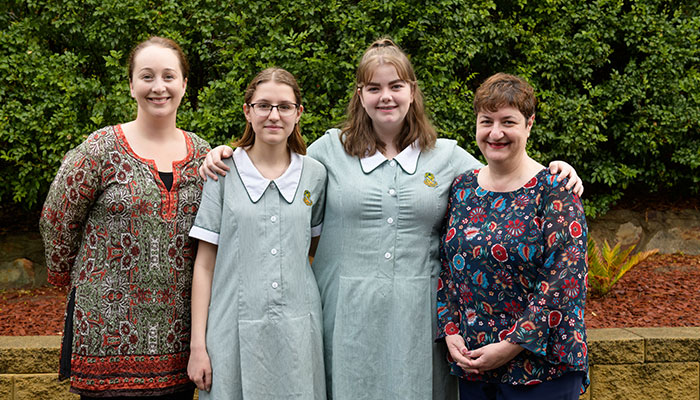Thousands of high school students are conducting interviews and running surveys for research projects that form part of their assessment tasks – but the curriculum does not include the use of consent forms for the participants of that research.

Do no harm: Todorov, pictured far right, spoke to students at St Patrick's Marist College Dundas about basic research ethics considerations as they planned their final year research projects with the help of staff member Stephanie Thompson, pictured left.
Macquarie University psychology lecturer Dr Natasha Todorov has addressed the gap for one group of high school students in a pilot seminar series that could be a template to improve school research ethics in future.
It’s a subject she’s passionate about: Todorov is an executive member of Macquarie’s Human Research Ethics Committee for Humanities and Social Sciences.
“School students are not systematically taught about research ethics, and they need to be, they are being asked to do projects that involve interviews and collecting data from human participants,” Todorov says.
I think that HSC students would benefit greatly from a short course in applied research ethics to supplement everything else that students learn about research during high school.
One group Todorov addressed last year was Year 11 students at St Patrick's Marist College Dundas, who were in the throes of thinking about their original research project for Year 12.
Her talk covered basic research ethical practice, such as the importance of maintaining confidentiality, and of obtaining ‘informed consent’, so people understood the reason for the project, what their role would be and how long it would take.
Todorov also explained how researchers can protect participants from risk and harm, for instance by explaining that they could choose to quit any time and providing information about places that participants could get help if research questions were distressing to them.
“Natasha presented a lot of really useful information to the students,” says Stephanie Thompson, a teacher at St Patricks.
“She covered some of the practical details, such as obtaining consent and understanding confidentiality, but also gave students a broader awareness about the implications of research.
“She explained that research is more than just asking someone questions and taking note of their answers, and also helped students think critically about where other research has come from and how that information was gathered,” Thompson says.
Research skills should be taught across three stages, Todorov says; design, evaluation and ethics. While design and evaluation are covered well in the HSC curriculum, students are not systematically taught about how to apply research ethics to their projects; for example, by requiring that they use consent forms as a matter of course.
Careful preparation for original research
Survey and interview-based assessment tasks are part of the curriculum for at least two popular HSC subjects – Society and Culture, and Community and Family Studies, says Todorov.

Respect: with many HSC students opting to do original research projects, Todorov says they would benefit from a short course in applying ethics, to ensure people who participate in research are given respect and protection.
NSW Education Standards Authority figures show that in 2019, there were 4,803 students enrolled in Society and Culture, and a further 8,669 students who did Community and Family Studies.
Todorov says that high school students are carefully prepared before they are given research-based projects, with various curriculum components that delve into the nitty-gritty of designing, planning, conducting and reporting on their original research.
Science students are taught about dependent and independent variables, the differences between an experimental group and a control group, and how to design a research project.
Maths students learn how to interpret the numbers resulting from their research, from understanding means, medians and modes to producing bar charts, line graphs and other ways to present data.
However, students are not systematically taught about how to apply research ethics.
“The topic of research ethics is not the same as philosophical ethics classes such as those covered in Primary Ethics classes,” says Todorov.
“I think that HSC students would benefit greatly from a short course in applied research ethics to supplement everything else that students learn about research during high school.”
Australia already has a standard for this practice, and school students should know about it, she adds.
The National Statement on Ethical Conduct in Human Research (2018) provides guidelines for every institution that conducts research in Australia.
“The guidelines help make sure that people who participate in research are given respect and protection, and that the research benefits the community,” she adds.
Making research ethics training available
With growing interest in research and personal interest projects in high school curriculums, many of these collecting original data, Todorov says that it’s becoming very important that a research ethics unit is made available to school students.
“We are in the process of conducting more pilots and looking at preparing materials to help teachers weave this material into their classes,” she says.
Useful materials for students include templates, such as a single screen ‘consent statement’ that can be included at the front of a survey, and links to useful wellbeing resources at the end.
- Please explain: why can we see the sun and the moon at the same time?
- Girls and boys are taught science differently, study finds
“Some students in geography, science and other subjects are also getting more opportunities to do original research involving data collection from a range of people,” she says.
“Applied research ethics training for high school is becoming more important as we see a growing number of students designing projects, often not realising they might be inadvertently coercing participation in their projects, perhaps leaving their participants unsettled at the end of questionnaires without recourse to having questions answered.”
Dr Natasha Todorov is a lecturer in the Department of Psychology.



